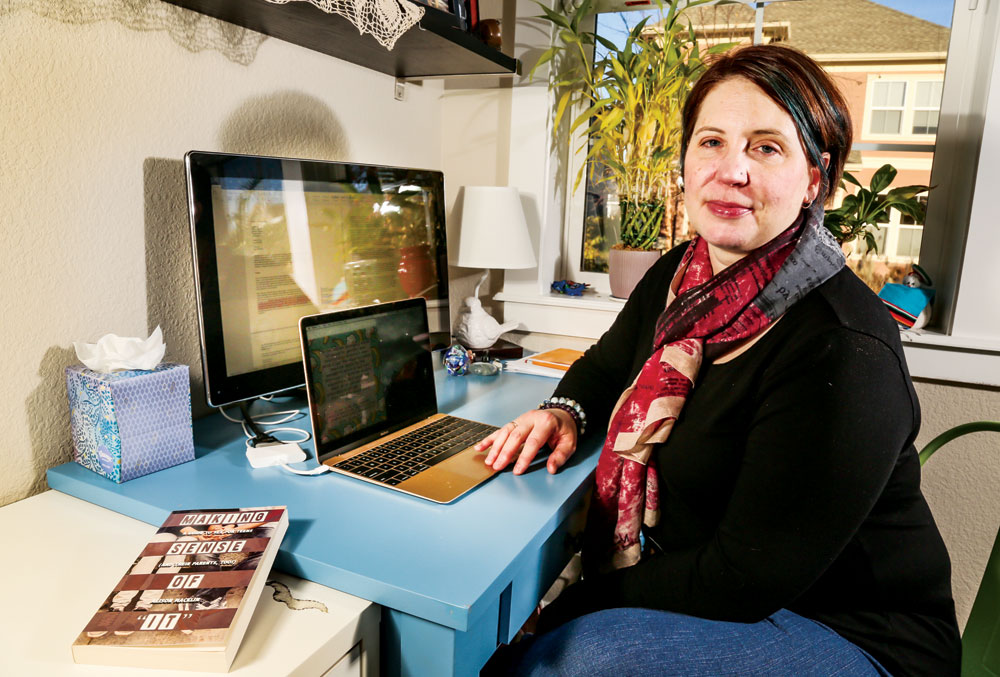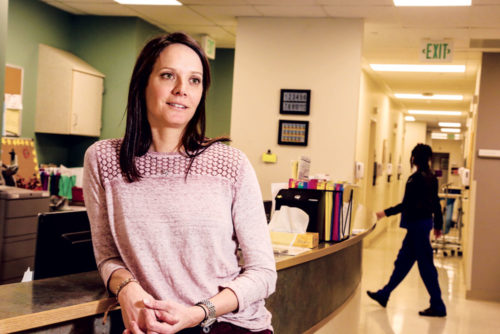
Alison Macklin, Stapleton mom of two, helps others have open and frank conversations about sex, sexuality and reproductive health. Her book, Making Sense of It. A Guide to Sex for Teens (and Their Parents) is available in area bookstores and online.
“Here’s a book. Let me know if you have any questions.” Alison Macklin, Vice President of Education and Innovation for Planned Parenthood of the Rocky Mountains, recalls these words as the extent of “the talk” her otherwise liberal parents had with her as a teen. Most perceptive educators and doctors today recognize that “the talk” is not a single conversation but an ongoing set of conversations around sexuality and sex. These may arise deliberately or organically, in response to a child’s pointed questions after hearing a new slang term or after viewing a movie or hearing a suggestive song.

Dr. Tricia Huguelet (left), specialist in pediatric and adolescent gynecology at Children’s Hospital Colorado tells parents they should not assume that their children are getting comprehensive sex education at school.
For the past 14 years, Macklin, a Stapleton parent of two, has devoted her professional life to helping others have open and frank conversations about sex, sexuality, and reproductive health. When it comes to teenagers, she encourages parents to discuss not just the mechanics of sex, but also—and more importantly—the feelings around sexuality and sex.
Dr. Tricia Huguelet, a specialist in pediatric and adolescent gynecology at Children’s Hospital Colorado and a Stapleton mom of three, adds to this advice. “Parents should not assume that their children are getting comprehensive sex education at school. Most kids know a lot less than parents think they know about sex; parents absolutely should be the primary source of information for their children.”
Most kids know a lot less than parents think they know about sex; parents absolutely should be the primary source of information for their children. —Dr. Tricia Huguelet
Some parents fear that talking about sex will cause teens to run out and have sex; however, evidence-based research affirms that neither sex education nor contraception cause teens to engage in sexual intercourse or risky behavior. Macklin says, “Teens who have ongoing dialogue with their parents about sex and sexuality typically are more likely to wait because they are better prepared to decide for themselves when they are ready to be in a physically intimate relationship.”
Some parents don’t open the door to these conversations. Others may reject their teen’s views or values, leaving their children feeling like sex and sexuality are not safe topics for discussion. Teens may then turn to friends or the internet for information, resulting in “misinformation or information that isn’t developmentally appropriate,” says Liz Romer, a nurse practitioner and executive director of BC4U, a federally-funded Title X clinic at Children’s Hospital in Aurora. BC4U’s goal is to provide the tools and information young people need to advocate for their own sexual health and well-being. The clinic does this by providing free birth control solutions, educational resources, and other reproductive health services to men and women under the age of 25.
Romer says the BC4U clinic is a safe and nonjudgmental place that provides medically accurate and developmentally appropriate information to teens. The service is free and completely confidential, and she and her staff see more than 4,000 patients a year. About half come without a parent. The colorful and user-friendly BC4U website (https://bc4u.org) allows clients to make appointments, pose questions, and get answers to common concerns.
“We honor that teens may have a hard time getting here, and we provide all services on-site, from education to birth control, so a patient walks out with their questions answered and their concerns met.” Romer says, “I wanted to be able to create a place where young women and men can get this information and develop their own knowledge and values around sex and sexuality.” BC4U has a separate adolescent waiting room to make teens more comfortable and reassures its patients that their information is kept confidential.
State law protects teens seeking sexual health services and contraception. They do not need parental consent to get these services. —Liz Romer
“State law protects teens seeking sexual health services and contraception. They do not need parental consent to get these services,” says Romer. She hopes that when young people come in, they are building rapport with BC4U providers so they will return for follow-up visits as needed and be advocates for their own healthcare. Many teens need time to figure out how to talk to their parents about their sexual health needs. BC4U provides support and care to teens during this time.
Dr. Huguelet is a proponent of providing teens with long-acting reversible contraception (LARC) such as IUDs (intrauterine devices) and implants. Unlike the birth control pill, which is only 95% effective for the most diligent of patients (and 90% effective for typical users who have an occasional forgetful day), LARC methods like IUDS are 99% effective and only need to be replaced every 5 years. One common misconception is that birth control causes weight gain; Dr. Huguelet says that this is only the case for some users of injectable birth control. Teens and parents should seek guidance and education on these and other concerns from their pediatricians, adolescent gynecologists, and other doctors specializing in adolescence. Dr. Huguelet encourages teens to have open and frank conversations about all of these issues with their parents, but understands that for some, “the talk” is still challenging territory.
In response to parental requests, Denver Public Schools’ school-based health clinics, operated by Denver Health, began dispensing contraception in 2010. These clinics offer a range of services, from routine dental care to immunizations to testing for sexually transmitted infections. Parents do have to sign a consent form for a child to receive care, but once that consent form is on file, students in grades 6-12 do not need to have a parent along or notify a parent as to the nature of their visit. For a complete list of services offered and sites see: https://www.denverhealth.org/services/school-based-health-centers
Of course, sex education is not just about teaching the mechanics of sex and making contraception accessible, but includes thoughtful discussions of sexuality and consent. As the #METOO movement reminds us, sex education also can teach our kids critical concepts like consent: What does it mean to say “yes”? How do you handle a “no”?
The wealth of resources in our community dedicated to reproductive health and well-being are no substitute for parental engagement. Conversations around values and feelings are paramount for many adolescents as they begin to explore their own identities.
Macklin reasons, “If you want your children to grow up to be adults who are in consensual and pleasurable sexual relationships, basic conversations while a young person is growing up act as stepping stones that allow them to discuss and explore their values with a trusted adult. They also help them learn how to communicate their needs, desires, and boundaries effectively with a partner.”
RESOURCES
Making Sense of It: A Guide to Sex for Teens (And Their Parents, Too) by Alison Macklin is available in area bookstores and online.
AMAZE includes a wealth of videos and information for middle schoolers, with topics covering bullying, puberty, and menstruation. There’s even a whole group of videos directed at parents wondering how to talk about sex and sexuality. See: https://amaze.org
BC4U: Clinic provides free birth control solutions, STD testing, and education to men and women under the age of 25. Can schedule an appointment and live chat on the website. Locations in Aurora, Wheat Ridge, Highlands Ranch and Colorado Springs. www.bc4u.org or 720-777-BC4U (2248)
Sex, Etc.: Created for teens, by teens, this website provides accurate and honest information to improve teen sexual health, as well as various ways for adolescents to get involved in various campaigns around sexual and reproductive health. www.sexetc.org
Youth Resource: In partnership with Advocates for Youth, this website is created by and for LGBTQ young people and provides information and support through education and advocacy. www.youthresource.com
Hotlines to call/text:
Love is Respect: Visit www.loveisrespect.org text “LOVEIS” to 22522, or call 1-866-331-9474 to talk with a peer advocate to prevent and end an abusive relationship.
National Sexual Assault Hotline: Visit www.rainn.org to chat or call 800-656-HOPE (4673) to get connected with a trained staff member from a sexual assault service provider in your area.
Planned Parenthood offers a sexual health text line dedicated to teens’ questions and concerns: text ICYC to 57890
Trevor Project: Visit www.thetrevorproject.org or text or call 866-488-7386 to receive crisis intervention and suicide prevention services for LGBT young people.


I thought by the title of this article that it would cover all sides, it does not. Why did you not include organizations that teach chasity? Because of bias of course. Why did you not include this sites as a resource? https://respectlifedenver.org/resources-for-chastity/ Until there is full coverage of all sides of an issue this is just a venue to push an agenda-yours.
Mr. Caldwell, providing kids with factual information about how the bodies reproductive system works, how contraception works, information on STDs etc doesn’t preclude having conversations with your children about chastity and why you value it. Even giving kids access to birth control doesn’t preclude you communicating your values.